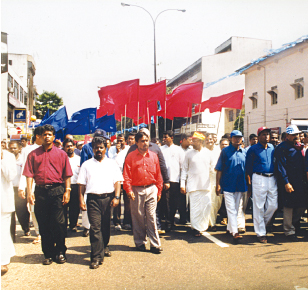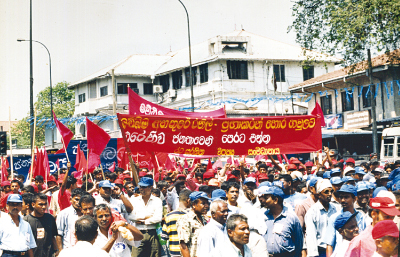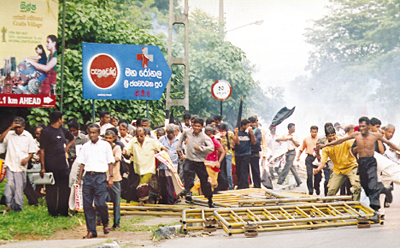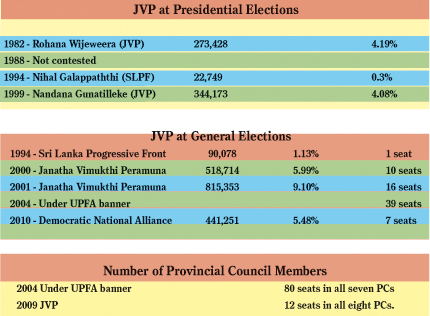|
Unreasonable demands:
Sharp decline in vote base:
JVP committed political harakiri
By Ranil WIJAYAPALA
The Janatha Vimukthi Peramuna which was formed in the mid-1960s,
unlike any other political party in the South, had many ups and downs
during the past four decades after becoming the most rebellious
political party due to its unsuccessful attempts to topple two
legitimately elected governments through failed insurgencies in the
1970s and late 1980s.
Today it has become a more controversial political party, having
aligned with different political organisations. Many political observers
view this development as a deviation from the very policies of its
founder Rohana Wijeweera.
At its inception in 1965 and later in the 1970s and ‘80s, the
People’s Liberation Front or the commonly known Janatha Vimukthi
Peramuna (JVP) was a formidable political force which had a hold over
some sections of the masses not due to its democratic credentials, but
due to its terror-driven tactics resorted to at village level. It was a
well-known fact that a boy who used to deliver a “chit” could bring a
bustling town into a standstill within minutes in the late 1980s during
which the JVP launched its second uprising which resulted in the loss of
precious lives of thousands of young party cadre.
This formidable political force, which was formed in May 14, 1965 as
an alternative to the then Left dominated by the Lanka Sama Samaja
Party, Communist Party and the Mahajana Eksath Peramuna, risked the
lives of the youth in this country twice, in 1971 and the late 1980s, in
its attempt to capture power through an armed uprising.
It was believed that more than 15,000 youths perished in the 1971
counter-insurgency operations. In the late ‘80s, an unaccountable number
of youth, more than 20,000, were buried in mass graves, tyre pyres and
rivers and lagoons. But, neither the country nor the JVP did achieve
anything except for the immeasurable sorrow bestowed on thousands of
people in this country.
JVP founder, Rohana Wijeweera had to pay for the sins he committed in
spoiling the minds of the country’s youth. He was killed while in the
custody of the then UNP Government in 1989.
|

With SLFP leaders |
The JVP, which put the country into peril twice in the recent past,
took such a long-time to realise the fact that their hair-splitting
arguments at political Platforms could merely ‘appease’ some sections of
the people, but not enough to assure the country of a brighter future!
JVP’s first political realisation about its own strength came only at
the 1982 Presidential election in which its founder Rohana Wijeweera
himself contested as a Presidential candidate. They realised the fact
that though they had many supporters to cheer them at political
meetings, only their hardcore followers cast their votes for them at
elections.
But they were not ready to accept the political realities and
continued to terrorise the society in the late 1980s, creating political
mayhem in the country in the guise of opposing the Indo-Sri Lanka Peace
Agreement signed during the Presidency of J.R. Jayewardene.
The JVP unleashed their terror campaign against the democratic
political parties in the country, having assassinated a number of
prominent politicians, journalists and artistes in the name of creating
a just society.
After the second failed insurgency, many of their leaders left the
party and protected their own political agenda after the People’s
Alliance led by Chandrika Bandaranaike Kumaratunga brought an end to the
17-year-long UNP regime in 1994.
The JVP took comparatively a longer period to make its re-entry into
mainstream politics as a democratic political party after its second
insurgency in the late 1980s as its leader Rohana Wijeweera and many
other prominent party members were killed during the UNP regime. The
only surviving politburo member Somawansa Amarasinghe fled the country.
They contested the 1994 General Election under the banner of the Sri
Lanka Progressive Front and secured one seat in Parliament.
|

The JVP protesting the Ceasefire Agreement

The party has often been associated with mayhem. |
Many of the JVP second-rung leaders including Nandana Gunatilleke,
Tylvin Silva and Wimal Weerawansa led the party when its leader
Somawansa Amarasinghe was in exile.They came through the hard way to
convince the people that they were no longer a party that believed in
armed struggles, but a political organisation that had full faith in
democracy.
It was in 1999 that the JVP entered mainstream politics, having
fielded Nandana Gunatilleka as their Presidential candidate and withdrew
his candidacy when President Chandrika Kumaratunga pledged to abolish
the Executive Presidency during her second term. However, Nandana
Gunatilleka secured 344,173 votes (4.08%) at the 1999 Presidential
Election.
As a political party they were able to establish their political
roots following this move.
Third force
The JVP tried its best to become the third political force in the
South and had its first try at the 2000 General Election contesting
under the symbol Bell.
In the 2000 election the JVP polled 518,774 votes, which was 5.99
percent of the total votes cast at the election. It paved the way for
the JVP to have a strong say in the Parliament, strengthening the
stature of Nihal Galappaththi who represented the Hambantota
constituency from the Sri Lanka Progressive Front, a JVP proxy.
The JVP, at the 2000 election, secured 10 seats in the Parliament,
contesting as a single party against the alliances of main political
parties.
The JVP grasped the opportunity to initiate its political bargaining
in the Parliament and outside and even extended conditional support for
President Chandrika Bandaranaike Kumaratunga to enable her Government to
continue in office when it had lost its majority in the Parliament as a
result of a number of PA heavyweights including S.B. Dissanayaka
crossing over to the Opposition.
It was during the probationary government in which the JVP extended
its conditional support to the then PA Government that the controversial
17th Amendment was passed in Parliament.
However, the Parliament was prematurely dissolved in mid-2001 when
the country was undergoing a major crisis. By this time the JVP had
established its roots in mainstream politics and had increased its
bargaining power with other political parties when the need was felt for
an alternative to the main political parties, the SLFP and the UNP.
It was under these circumstances that the JVP, as a single political
party, reached its climax at the 2001 election at which it had its seats
in Parliament increased from 10 to 16. As a single party, the JVP
managed to increase its vote base from 518,774 votes to 815,353 within a
span of two years. The percentage of the votes they received was 9.10.
They secured 13 seats at district level and three seats from the
National List.
The return of its leader Somawansa Amarasinghe to Sri Lanka was
expected to give a political boost to the JVP at this election.
Many people were of the opinion that had Somawansa Amarasinghe
remained in exile, the victory of the JVP would have been much more
certain but they lost their hopes when he appeared at a stage at
Kalutara at the peak of the election campaign. People were, in fact,
waiting for a leader of the stature of Rohana Wijeweera.
 The ambitious JVP continued to increase its bargaining power with its
9.1 percent vote base. Their adverse criticism of the Ceasefire
Agreement signed by Premier Ranil Wickremesinghe with the LTTE and their
strong stance against LTTE terrorism paved the way for them to achieve a
major political success. The ambitious JVP continued to increase its bargaining power with its
9.1 percent vote base. Their adverse criticism of the Ceasefire
Agreement signed by Premier Ranil Wickremesinghe with the LTTE and their
strong stance against LTTE terrorism paved the way for them to achieve a
major political success.
Local authority
It was not JVP leader Somawansa Amarasinghe, but its Propaganda
Secretary Wimal Weerawansa and MPs Anura Kumara Dissanayake and Vijitha
Herath who made the party more popular among the people.
At the 2002 Local Government election the JVP could increase its vote
base further, having captured power of the Tissamaharama Pradeshiya
Sabha, the local authority they won for the first time.
Its popularity helped the JVP to forge a broader alliance with a
major political party such as the SLFP in January 2004. The new
political alliance was called the United People’s Freedom Alliance. It
was on January 20, 2004, that SLFP General Secretary Maithripala
Sirisena and JVP General Secretary Tylvin Silva signed the historic
agreement to create a broader political alliance against the UNF
Government led by Ranil Wickremesinghe.
Patriotism was the key slogan of the JVP and the one time political
arch rivals sat in one political platform for the sake of safeguarding
the motherland against its betrayal by the then UNF Government. They
also attacked the ‘Regaining Sri Lanka’ program of Premier Ranil
Wickremesinghe.
JVP leaders together with President Chandrika Kumaratunga addressed
political rallies across the country.
It created a solid base for the JVP leaders to make their entry into
Parliament by dozens for the first time in the political history of the
country. Even strong SLFPers voted for the ‘JVP boys’ and many SLFPers
failed to be elected at the April 3, 2004 General Election.
Thirty nine JVP members of Parliament entered the legislature under
UPFA banner, having obtained the highest preferential votes from almost
all the districts. Only one Member of the JVP could not make his entry
to Parliament, it was learnt.
Later they accepted four Ministerial portfolios in the Cabinet and
four Deputy Ministerial portfolios.
Anura Kumara Dissanayaka, Vijitha Herath, K.D. Lalkantha and
Chandrasena Wijesinghe were sworn in as Cabinet Ministers and Bimal
Ratnayaka, Samantha Vidyaratna and Sunil Handunnetti accepted Deputy
Ministerial portfolios.
However, they later withdrew from the Government after sharp
differences with President Chandrika Bandaranaike Kumaratunga over the
Post-Tsunami Operational Management Structure in June 2005.
They also withdrew their support to the UPFA at all Provincial
Councils. They had 80 Members elected to the Provincial Councils under
the UPFA banner. Their withdrawal created a problematic situation for
the UPFA in the administration of certain Provincial Councils.
This helped the JVP gain major political mileage, but they extended
their support to Mahinda Rajapaksa, the SLFP nominee for the 2005
Presidential Election. There were hopes among the people that the JVP
would re-join the Government once Mahinda Rajapaksa became the President
in November 2005.
According to political analysts, the JVP would have maintained its
position in mainstream politics if it had been wise enough to accept the
invitation extended to them by President Rajapaksa to join his
Government.
Allocation of nominations
Even President Rajapaksa’s initiation to contest the 2006 Local
Government election under the UPFA banner was also rejected over an
issue relating to the allocation of nominations. However, the JVP
managed to run the administration of the Tissamaharama Pradeshiya Sabha,
having secured seven seats out of the 12.
It was the JHU’s decision to extend its support to the Government
which dealt a severe blow to the JVP as the Government now had a partner
carrying the same patriotic slogans of the JVP. Many political analysts
were of the opinion that they had to act against their own conscience
when they decided to go against the Rajapaksa regime for no valid
reason.
That was the political harakiri the JVP committed, leading to its
downfall over the political precipice over the past few years.
The decision of the party to oppose the Rajapaksa regime at certain
instances created huge cracks within the party. The party was divided
into two factions over differences of opinion.
Much secretive politburo decisions of the JVP were made public and
the true dictatorship of the JVP leadership was exposed to the country
when a faction led by its Propaganda Secretary Wimal Weerawansa and nine
other MPs decided to leave the party when the JVP politburo wanted to
suspend the membership of Wimal Weerawansa. Weerawansa was among the
JVPers who wanted to extend their support to the Rajapaksa
administration in its efforts to eradicate terrorism. However, the
sentiments of these members who wanted to side with the majority opinion
of the public were not heeded by the JVP leadership.
The JVP experienced a further downfall in their political journey
when Weerawansa and nine other dissidents formed the National Freedom
Front and later extended their support to President Rajapaksa and his
Government. The JVP had to repent over their decision when the Mahinda
Rajapaksa administration won the war against terrorism in May 2009. They
realised the short-sightedness of their decision to distance themselves
from the Rajapaksa administration at each Provincial Council Election
held in 2008 and 2009, as they obtained only 12 seats in all eight
Provincial Councils. Earlier, they had 80 seats in seven Provincial
Councils.
But their greatest setback came at the last general election when its
vote base was reduced by less than 500,000. It was due its inability to
stick to one set of policies. Their attempts to align with parties with
completely different policies, just to quench their hunger for power,
led to its downfall.
They continued to commit political blunders when they decided to
align with the United National Party, Sri Lanka Freedom Party (Mahajana
Wing), the Sri Lanka Muslim Congress led by Rauff Hakeem, Democratic
People’s Front led by Mano Ganeshan and moreover with the Tamil National
Alliance to make former Army Commander, Sarath Fonseka as a Presidential
Candidate.
Their intention was to ‘market’ Fonseka for their political gains
just to have their share of the victory of the war against terrorism.
They became political jokers when they sat with the political leaders
who made a mockery of the military victories, just to go against the
Rajapaksa administration.
Unholy agreement
They were aware that they were making an unholy agreement with
political parties which never matched their political ideologies.
But their isolation by their former allies in patriotic politics made
them to act in a more hostile manner against the same leader whom they
supported at the 2005 Presidential election. That was a move made
against their conscience and it was the most unwise decision taken by
the JVP to hasten their downfall in politics.
It seems they were not prepared to learn lessons from their mistakes
that forced them into a political precipice. They opted to march on the
same unwise path they had chosen at the 2010 General Election too.
Not only have they lost their political identity, but they have also
made their party a ladder for outsiders to make their way to Parliament.
Maybe, the JVP had lost the strategic thinking it had earlier, but
now it is heading toward political bankruptcy.
The JVP should realise the fact that patriotism is not a commodity
that can be sold to the public to obtain votes. It is a strong feeling
and bond that can keep the people together. The JVP had lost that
flavour of patriotism and the people feel that they have distanced
themselves from that strong bond.
That was why the people of this country rejected them outright at the
general election, leaving them only with seven seats in the Parliament,
securing only 441,251 votes, which is only 5.49 percent of the total
votes! Even the three seats have gone to an outside party as they
contested as the Democratic National Alliance.
They could not maintain the climax they had reached in 2001 as a
single political party.
They could not have an MP elected even from their stronghold,
Hambantota this time. They lost the seats they had earlier in
Anuradhapura, Kurunegala, Kandy, Matara, Ratnapura and Kegalle. The JVP
should realise that it had obtained only 441,251 votes, which is a
little more than the preferential votes (425,861) obtained by Minister
Basil Rajapaksa from the Gampaha district.
That was less than the votes obtained by them earlier, contesting the
general election as a single party.
They should remember the fact they obtained 10 seats at the 2000
election and 16 seats at the 2001 general election.
What they should realise is that when they became an ally of the
patriotic bloc and critics of capitalist clans, they were much more
popular among the public than when they were making alliances with
unpatriotic elements.
Therefore, the JVP should realise that they are now in the political
wilderness more than ever in history and are fast becoming political
dwarfs if they fail to change their policies with regard to the grim
realities of the society. |

